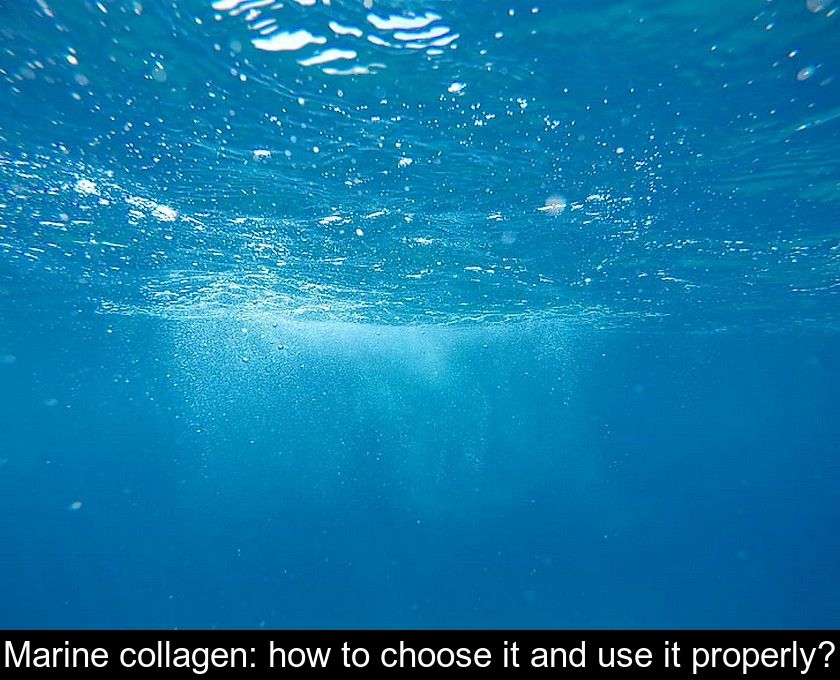Marine Collagen: How To Choose It And Use It Properly?
New star asset in the dietary supplement department, marine collagen has anti-aging benefits for the skin as well as for joint flexibility. If you are not yet familiar with this miracle ingredient from the sea, we invite you to discover how to choose it wisely and use it as part of a treatment.
What is marine collagen?
Marine collagen is a new anti-aging ingredient that is gaining a lot of attention, just like hyaluronic acid, vitamin C, or retinol...
In the realm of anti-aging cosmetics, it is used in the formulation of some plumping treatments, such as serums or creams, and is also available in the form of dietary supplements in capsules or powder.
A few years ago, the first cosmetic treatments with collagen were derived from bovine sources. Today, these ingredients are no longer used for ethical reasons. They are replaced by plant-derived procollagens from cereals or yeasts, or by collagen sourced from marine sources such as seawater, plankton, crustacean shells, algae, and fish scales.
Why take marine collagen?
Collagen is a substance from the protein family. It is naturally present in the human body, which has no less than 28 different types, in connective tissues, skin, cartilage, tendons, and ligaments.
In our body, it is important to distinguish 3 main types of collagen:
• Type I is the most abundant and is found in the skin, tendons, and bone tissues
• Type II is found in cartilage
• Type III is present in muscles and vessel walls.
The three types of collagen work together to form a solid mesh and ensure tissue healing, elasticity, and regeneration. A young and healthy skin contains up to 75% collagen, giving it a supple and smooth appearance.
However, starting at the age of 25, fibroblasts, the small factories that produce collagen, elastin, and hyaluronic acid become less efficient. The natural production of collagen decreases over time, causing the skin to become drier, thinner, and more wrinkled.
In addition to this natural aging process, external factors such as exposure to UV rays from the sun, air pollution, and stress alter the quality of collagen in the skin. This causes the skin to become duller and less plump, which is why it is important to regularly use skincare products containing collagen or undergo collagen treatments.
How to properly use marine collagen?
Even though anti-aging serums and creams containing marine collagen have an interest in hydrating and plumping the skin, this anti-aging ingredient is even more effective when taken as a dietary supplement.
Supplementation in the form of capsules, drinkable ampoules, or powder dissolved in water allows for action at the deepest layers of the skin.
Provided that a micronized and hydrolyzed collagen is chosen (meaning it is broken down into small molecules called collagen peptides), this ingredient is well assimilated by the body. In this form, collagen is absorbed 90% and stimulates the activity of fibroblasts.
Furthermore, when taken orally, collagen degrades less than when directly applied to the skin. In the latter case, this ingredient comes into contact with air and fingers, which reduces its effectiveness.
On the contrary, an oral treatment improves the beauty of the skin, nails, and hair "from the inside". This new favorite ingredient in anti-aging cosmetics would allow for better skin regeneration, resulting in a better-defined facial contour, smoother and plumper skin, and a fresher complexion.
Which marine collagen to choose?
To choose your marine collagen correctly, check the following points when making a purchase:
• The origin of the collagen (bovine or marine), with marine collagen being preferable as it is better assimilated.
• The type of collagen according to your needs: type I for skin health and type II for joints.
• The form: prefer hydrolyzed collagen as it is better absorbed by the body.
Also, prioritize an oral treatment as dietary supplements have better effectiveness and a global action on the skin, nails, and hair.
Regarding the recommended dosage, it is advisable to take a maximum of 10g of marine collagen per day for a period of 1 to 3 months to obtain a visible effect on skin beauty.
What are the dangers of marine collagen?
There are few contraindications to supplementation with marine collagen. This type of treatment is not recommended for individuals with renal insufficiency and intolerance to seafood.
Another health risk could come from poor quality dietary supplements. Therefore, be very vigilant about the origin of the collagen and prioritize products from sustainable aquaculture to avoid a high concentration of heavy metals in the product.
Note: Pregnant or breastfeeding women should seek medical advice before any supplementation.






